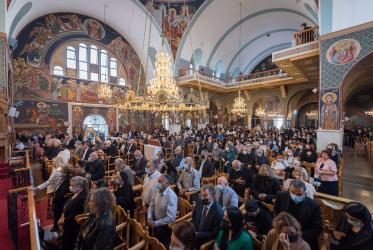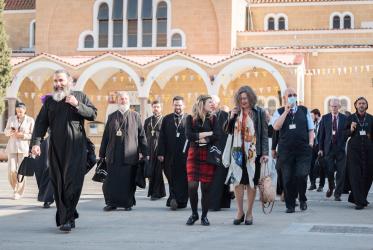Document
by John Briggs
- 50 years on from 1948: Post Cold War, Post colonial politics and economics.
- Melting pot of peoples, all on the move: people from the east in the west (diaspora) and west in the east (missionary agents). South in the north (diaspora) and north in the south (missionary agents).
- Changed weight of Christian allegiance north to south: contribution of the leadership of churches in the south to the ecumenical movement.
- WCC no longer represents the major part of Christendom: growing churches -- independent, charismatic, evangelical -- mainly outside WCC membership.
- Changed attitudes of RC Church to ecumenical involvement. Widespread participation in national councils, and some presence in regional organisations or working of bishops' conferences with the same.
- Increased Orthodox discomfort about developments in the WCC and some of its member churches. (Issues relating to the ordination of women, use of inclusive language, parliamentary procedures used to the exclusion of consensus and respect for hierarchy, sexual identity discussions, claimed syncretism', patterns of worship, pressure on spread of representation etc.) Some of these concerns echoed in some evangelical churches.
- Evangelicals sometimes feel marginalized by state churches, including Orthodox state churches. New legislation raises questions of religious freedom.
- Some Orthodox churches concerned about the free-trade' in evangelistic endeavour, post the fall of communism, especially when wealthy mission agencies offer rewards and deploy technology beyond the economic reach of local churches.
- In other churches women and youth increasingly aspire to full participation in church life. However, youth seem increasingly distant from mainstream church life.
- Many NCCs and REOs, as well as, e.g., Faith and Order and CWME, successfully embrace wider membership than the WCC.
- Impact of bilateral conversations and other forms of agreement between confessional groups, though fewer new united churches established.
- Emergence of fundamentalism within all church families, and beyond.
- Other world faiths become increasingly missionary-minded.
- Continuing concern with issues of structural injustice, the dominance of violence and the fragility of the peace in many areas; concern for issues of ecology and biotechnology. Problems of refugees reaching crisis proportions.
- Problems of funding the ecumenical enterprise, reduction of global facilities. Increased parochialism and inward-lookingness in many parts.
- Relentless march of secularization.




